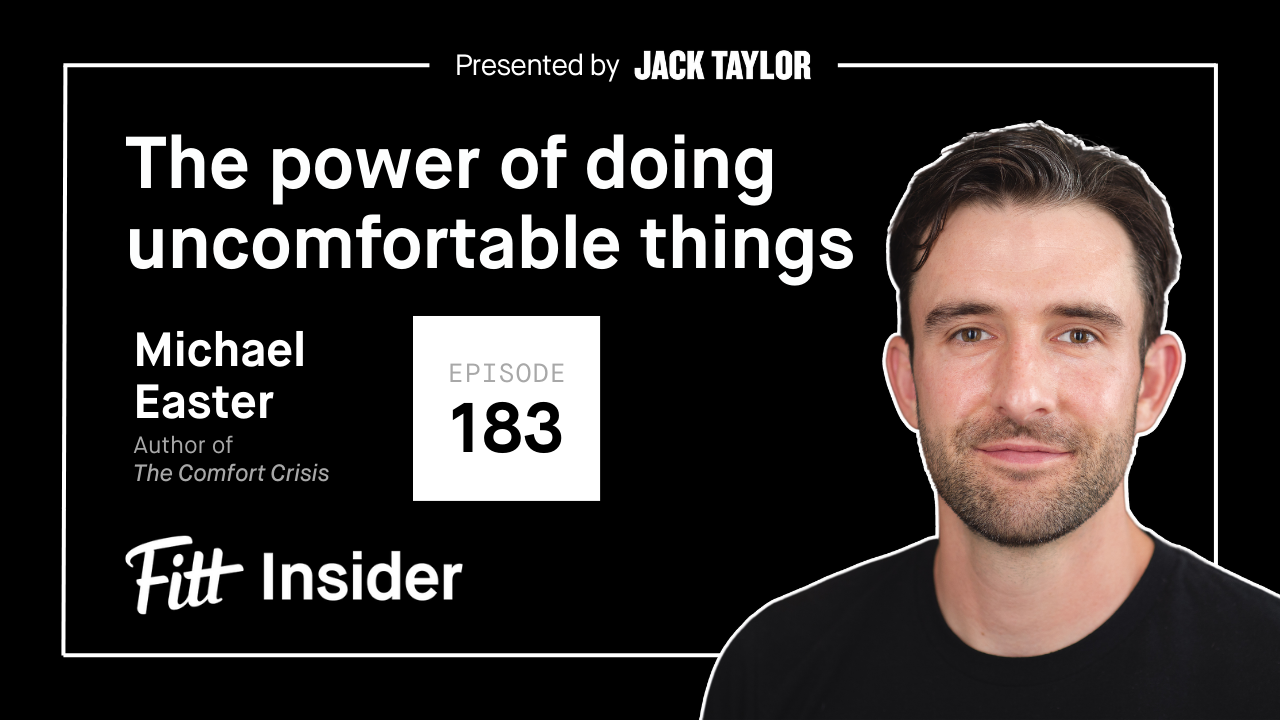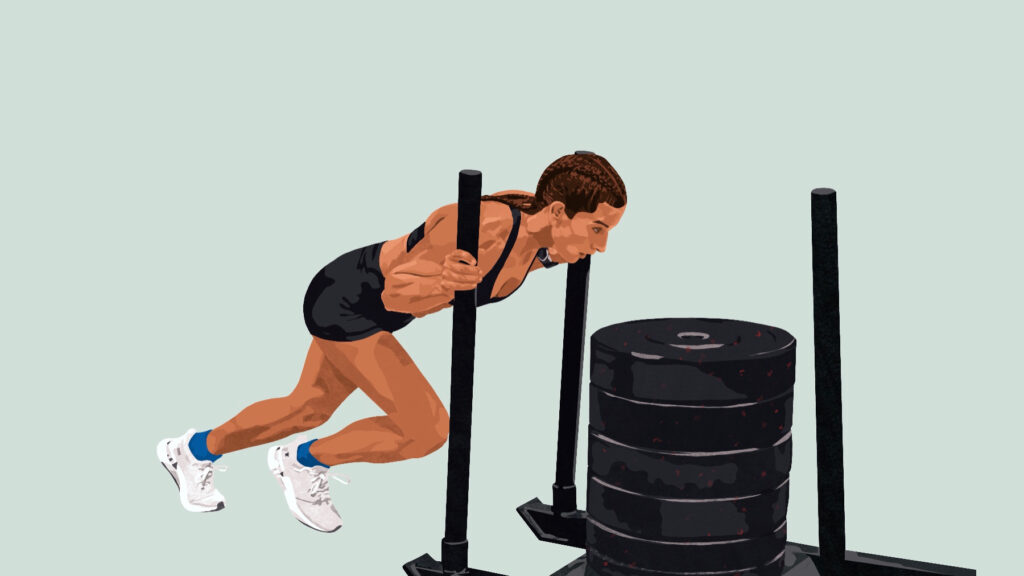Fitness racing may be coming to a gym near you.
Hybrid Racing
Turning functional fitness into a global event series, HYROX is in expansion mode.
Lesser known in the US, the Hamburg, Germany-based company has been honing the “world series of fitness racing” since 2017.
Founded by veteran multisport race organizer Christian Toetzke, every event combines strength and endurance feats in a standardized format.
Racing against the clock, participants complete alternating circuits of one-kilometer runs, followed by a prescribed distance or rep count of exercises like sled pushes and burpees, repeated eight times.
A cousin of CrossFit, Toetzke credits the brand with helping popularize functional fitness. But, he says, its emphasis on max-effort Olympic lifts and technical gymnastic skills can be intimidating.
Similarly, because the CrossFit Games feature ever-changing workouts that aren’t revealed ahead of time, there’s a high barrier to entry.
Taking a more inclusive approach, HYROX’s timed, familiar format is catching on:
- 65 events in 17 countries are slated for the ’23/’24 season.
- It expects to host 120K participants, up from 35K two years earlier.
- 1K affiliated gyms offer HYROX training, with 40 new licenses sold each day.
Getting a boost, sports marketing firm Infront acquired HYROX last year, with the goal of reaching half a million participants within the next four years.
Hitting the gym. Pushing the pace, HYROX just launched in Australia and partnered with Xponential Fitness-owned Body Fit Training (BFT).
As part of the deal, BFT studios in Australia, Europe, and Asia will act as HYROX training centers, hosting all-levels classes based on the event’s programming.
Entering new markets and teaming with existing gym operators, HYROX hopes the sport of fitness becomes a mass-participation event.
The Everyday Athlete
Creating the marathon equivalent of fitness has the potential to be a lucrative and impactful endeavor.
- There are 190M gym members globally.
- 52% of European gym-goers say fitness is their primary sport, per Deloitte.
- Sports and fitness make up $339B of the $800B physical activity sector.
As demand for strength-based, longevity-enhancing workouts climbs, competitions geared towards functional fitness appeal to a growing base.
A step further, merging sport and fitness in mass-participation events could help combat the rise of inactivity, obesity, and loneliness.
Putting a new spin on adult sports, building community around training for and competing in fitness challenges, event organizers are scaling up.
- The 2023 CrossFit Open attracted 302K sign-ups, albeit lower than its peak of 416K in 2018.
- Founded in 2017, UK-based Turf Games is hosting events in London, Dublin, Gold Coast, and Dubai this year.
- Spartan Race is expanding its fitness decathlon DEKA FIT, offering events, gym affiliates, and coaching certifications.
- Debuting this fall, Hybricon Games from Battle Bunker aim to set the benchmark for both mental and physical conditioning.
Elsewhere… Manufacturing gear and hosting events, GORUCK wants to make rucking (weighted walking or hiking) more popular than running.
Another approach, gym chain Life Time operates its own events business, hosting more than 30 running, cycling, and multisport competitions nationwide.
Looking ahead: Despite a series of missteps and leadership changes, CrossFit’s influence on the sport of fitness is undeniable. So much so, that even as event organizers try to replicate its model, the pared-down competitions are still inaccessible for most people.
With 50%+ of people experiencing “gymtimidation,” toeing the starting line next to superhero-like athletes is sure to cause event-timidation. Of course, that experience could also prove to be inspiring for newcomers.
So, while some competitions continue to push the limits, there’s still plenty of room for more accessible options engineered for fitness and fun.
🎙 On the Podcast

Michael Easter, author of The Comfort Crisis, explains his philosophy of rewilding the modern lifestyle for better health and happiness.
We also cover: the value of discomfort, the pitfalls of wearables, and his 2% rule for self-improvement.
Listen to today’s episode here
💧 CURE Hydration adds new funding to fuel retail expansion
Functional hydration brand CURE raised $5.6M in a Series A round.
Offering no-sugar-added mixes, the electrolyte drink maker has increased revenue 230% YoY since 2019.
Eyeing new growth channels, CURE is preparing to scale its retail footprint from 4K stores in 2021 to 15K in 2023.
In the mix. Beverage and supplement brands are drinking up the hydration boom.
- After raising $70M and growing DTC sales 400% YoY, Swiss electrolyte cube maker waterdrop recently signed a hybrid distribution deal with Walmart.
- Prime Hydration, a sports drink created by influencers Logan Paul and KSI, did $250M in sales in its first year and signed with BASE Sports Group to fuel youth sports nationwide.
- Fresh off a $36.8M funding round, electrolyte/antioxidant drink Lemon Perfect just announced nationwide retail distribution through Target.
Smart sips. Going beyond what or how much we drink, hydration-sensing tech wants to quantify our consumption.
- Gatorade worked with Epicore Biosystems on a hydration-sensing sweat patch, which integrates with a smart water bottle to monitor and recommend electrolytes.
- Nix, a noninvasive skin patch evaluating fluid and electrolyte losses in real time, synced with Garmin to quantify hydration, with future integrations planned with Strava and Zwift.
- London’s FLOWBIO is developing its hydration skin patch with elite cyclists, while hDrop’s strap-on sensor has a deal with USA Cycling.
Takeaway: BioSteel, Liquid I.V., LMNT, Hydrant, Gainful — the number of entrants in the functional hydration category could go on and on. That means the battle for retail shelf space will become even more heated.
🩳 Aussie activewear brand LSKD debuts Stateside
After opening its first US retail store in San Diego earlier this month, the Australia-born activewear company inked a partnership with Life Time.
Part of an exclusive partnership, LSKD will outfit the gym chain’s 4.5K female trainers with co-branded leggings and tops.
Fresh threads. Founded in 2007, the formerly DTC brand (pronounced “loose kid”) won fans in the local fitness and sports communities.
Gaining traction, the company recorded $33.7M in revenue last year. Adding stores, it’ll have nine outlets open across Australia, New Zealand, and the US by year’s end.
Going global. Catering to younger generations and fitness seekers alike, apparel brands are entering new markets in pursuit of frontrunners like Nike.
- Swiss running brand On topped $1.3B for 2022, its apparel business is growing 30.2% YoY, and it recently launched experiential retail and running festivals.
- NOBULL extended its no-frills functionality to all-around performance, landing funding from the NFL and opening an experiential store in London.
- After raising $400M at a $4B valuation in 2021, SoCal-style activewear brand Vuori launched into Europe, Canada, and Australia last year.
Stretched too thin. But, not every activewear brand is hitting its stride. Adidas, Gap-owned Athleta, and Wolverine Worldwide-owned Sweaty Betty recently replaced their CEOs after stagnant growth, while UK-based Gymshark enacted layoffs this year.
Punchline: LSKD is having its moment, and its partnership with Life Time’s 160+ properties provides immediate exposure in the States. But, to compete with well-established international retailers, it’ll need to prove its vibe is more than just a passing fashion.
📰 News & Notes
- Peloton, Hilton expand international partnership.
- lululemon seeks buyer for MIRROR fitness screen.
- Strava integrates in-app music control with Spotify.
- Google Maps adds National Park exploration features.
- Marvel plans superhero-themed interactive fitness app.
- Albertsons’ wellness app ties Apple Watch activity to rewards.
- Preventative lifestyle medicine enters curriculum at med school.
- Fitt Jobs: The path to your health & fitness dream job starts here.
- Startup Q&A: WeNatal’s Ronit Menashe & Vida Delrahim on prenatals for couples.
💰 Money Moves
- B2B behavioral health platform Spring Health raised $71M at a $2.5B valuation.
- [solidcore] founder Anne Mahlum sold her stake in the boutique fitness company to Kohlberg & Company for an undisclosed sum.
More from Fitt Insider: Our conversation with Anne Mahlum - Functional hydration brand Cure closed $5.6M in a Series A round led by Lerer Hippeau.
- Teamworks, an organizational management platform for elite performance, secured $65M in a Series E round led by Dragoneer.
- In-home integrated care provider MedArrive secured $8M in a funding round led by Cobalt Ventures.
- Overwater Ventures closed a $20M fund investing in healthcare, AI, climate tech, and the future of food.
- Scene Health, a medication adherence platform, added $17.7M in a Series B round led by ABS Capital Partners.
- Recuro Health, a virtual care and diagnostics company, closed a $47M Series B led by ARCH Venture Partners.
- Pomp Beauty, a marketplace for skincare professionals, added $3.26M in new funding.
- TARA Mind, a psychedelic therapy platform, emerged from stealth with $3M in pre-seed funding from Red Cell Partners.
- Reproductive care platform Twentyeight Health acquired digital reproductive health platform SimpleHealth.
- MedX Fit Tech, a fitness technology platform led by six-time Mr. Olympia Dorian Yates, acquired MedX, maker of namesake exercise equipment.
- Climbing gym chain Movement Climbing, Yoga and Fitness acquired four Dallas-area Summit Climbing, Yoga and Fitness locations.
Today’s newsletter was brought to you by Anthony Vennare, Joe Vennare, and Ryan Deer.






